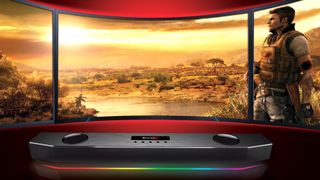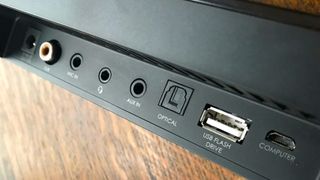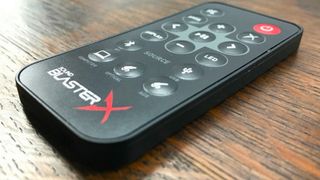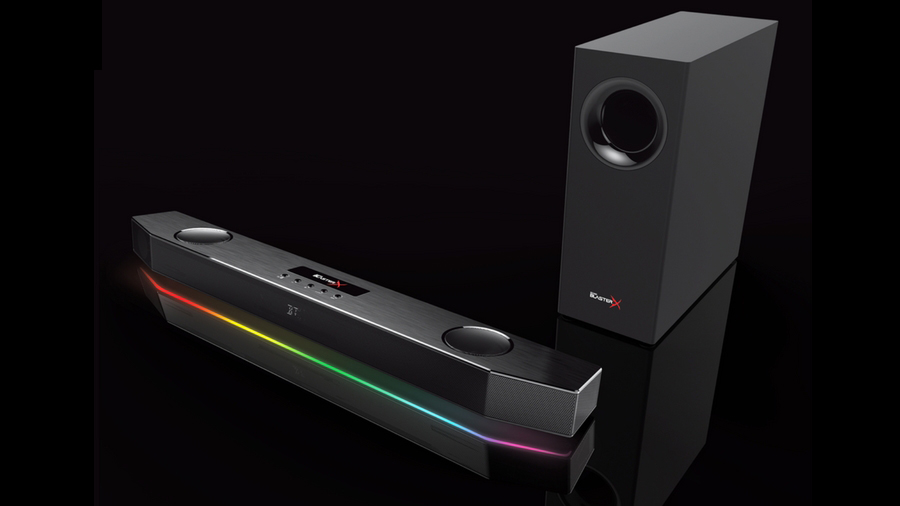TechRadar Verdict
This incredibly loud soundbar for desktops impresses with music as well as games, though it's desk space-saving USP is marred by its use of a wired subwoofer.
Pros
- +
Powerful sound
- +
Bluetooth
- +
Optical audio input
- +
RGB light show
Cons
- -
Wired subwoofer
- -
Overkill for most desks
- -
Lacks HDMI
- -
2.1 sound only
Why you can trust TechRadar
Update: The SoundBlasterX Katana will now be compatible with PS4 consoles, Creative recently announced. To hook your soundbar up to a PS4, all
you need to do is connect the console to the system via a USB cable.
Why are there not more soundbars for desktops? If you have a pair of speakers, a regular-sized desk and perhaps a 24-inch monitor, it's likely that you're fighting for space. Cue the SoundBlasterX Katana, a soundbar for pairing with a PC monitor that creates 2.1 audio – using a separate, wired subwoofer – and offers a whopping 75W of power.
Although a relatively rare genre, the Katana does have competitors, most notably the ageing Razer Leviathan and the even older XtremeMac Tango bar. This is the first soundbar for desktops that we've seen for a good few years. It's selling for $299.99/£279.99 (about AU$390).
Design
The Katana has a robust build quality. Measuring 59cm long, it has two small feet beneath it, which creates about a centimetre of clearance between it and the desk.
Cue a pleasant floating look, with the speaker angled slightly up towards the user. Audio-wise, that's an excellent design, while on each end there's a separate 7cm speaker grille that enables the Katana to project sound slightly to the sides.
Despite its heavyweight feel and 1.5kg bulk, it looks super-sleek (save for an over-the-top brand logo), with a height of just 4.5cm, depth of 8cm, and a black, brushed aluminium finish.

Set-up
Physically, the Katana is a little difficult to house on a desktop. Not because there's anything wrong with the main unit, but because the subwoofer must be tethered to the soundbar using a relatively short cable.
It measures about two metres, which may sound like a lot, but once you've trailed a cable behind a desk and position the subwoofer in a convenient place, it's not enough. Ditto for the power cable for the sound bar itself, which links first to an external power pack, and then to a wall socket.
If you were in any doubt that the Katana is meant primarily for desktops and not for living rooms, the ins and outs on its undercarriage make it clear. Back there you'll find a subwoofer connector alongside inputs for a microphone, a 3.5mm aux, an optical audio input, a USB slot (for USB audio), and a microUSB.
Note that you could use this soundbar in your living room using optical or 3.5mm, or perhaps in a second room with a 26 inch TV (though it would suit a 32 inch TV just as well, size -wise). However, soundbars created for the living room typically use an HDMI input, which the Katana lacks.

Performance
The chief reason why the Katana works well is that the user has to sit pretty close to it. Unlike a soundbar, which disperses sound all over a room with varying degrees of success, Katana's two tweeters, two mid-bass drivers, and one separate subwoofer do have its audience at close quarters.
Cue some decent audio effects though the promised 7.1 virtual surround sound effects can scarcely be heard. However, the overwhelming impression is one of volume. Serious volume. As in, far too much of it. We got no further than about 25% through its volume capabilities, having already reached deafening levels. Both game soundtracks and music is handled well, with plenty of mid-range and bass, though treble detail is its defining characteristic.
It's got a DAC capable of 24-bit/96Hz lossless playback via USB or optical, so you can stream hi-res FLAC and WAV audio files. The clarity at close-quarters is impressive, with some exceptional detail demonstrated by what is as effectively an add-on PC soundcard.
At the other end of the spectrum, even songs streamed from a phone over Bluetooth have pleasing breadth and treble detail. Overall, the subwoofer does OK, but can sound a little blunt.

Verdict
Soundbars are hot, growing in sales by 15% every year, so it's no surprise that Creative is attempting to spread the love to the desktop by designing an 'under monitor audio system'. We're wondering why few other speaker and soundbar brands have tried it, because the Katana proves a surprising success.
We liked
Firstly, it saves a lot of space. Anyone with a relatively small desktop, especially those with a super-wide monitor with a 21:9 aspect ratio who no longer have room for separate left/right speakers, is likely to be in short supply of space, and the 59cm-long, 4cm high slimness of the Katana does come in handy.
If its sleek build quality isn't alluring enough, the Katana arrives in a box covered in pictures of the Northern Lights.
Initially, we found this quite amusing, figuring that Creative thought a nice picture of a magnetic storm might increase sales. However, it soon became clear that it sports a rather nifty RGB light show.
Now, it's nothing like a Northern Lights display, obviously, and nor does it even match-up to the colours spewed by a Philips Ambilight TV, but an LED button on the remote toggles between various light modes, one of which is for a rainbow of colours (16.8 million, to be exact) that gently projects downwards onto the desk. It subtly changes, and covers the whole spectrum of colours, and is really rather nice when the lights are off.
We disliked
It's not cheap, and nor is the best pick for the living room despite its stunning volume levels. Why? There's just no true surround sound – it just manages some stereo separation. That's not to say it's the worst we've heard or that it would fail in smaller rooms, but there are better options out there for that scenario.
Although the subwoofer is relatively slim (at 13x30x30 cm) and passive, so doesn't need wiring-up to anything but the soundbar itself, it would be much better if it was wireless.
However, it's a little blunt for ultimate sound quality. The least impressive part of the Katana is the tiny 8x4cm remote; it's the kind of remote you expect with a throwaway no-name gadget.
Final verdict
It's sleek, it's powerful – perhaps too powerful – and it's got Bluetooth. If anything, the Katana leaves you wanting not more, but less, with its volume and bass levels potentially a little overwhelming at close-range on a desktop.
However, that extra oomph gives the Katana a deserved place perhaps not in a living room, but certainly next to 32-inch TV in a second room or bedroom. That said, with only 2.1 sound, at its core the Katana is best thought of as a powerful and space-saving upgrade for PC games and music alike.
Jamie is a freelance tech, travel and space journalist based in the UK. He’s been writing regularly for Techradar since it was launched in 2008 and also writes regularly for Forbes, The Telegraph, the South China Morning Post, Sky & Telescope and the Sky At Night magazine as well as other Future titles T3, Digital Camera World, All About Space and Space.com. He also edits two of his own websites, TravGear.com and WhenIsTheNextEclipse.com that reflect his obsession with travel gear and solar eclipse travel. He is the author of A Stargazing Program For Beginners (Springer, 2015),

Here's a great idea! MSI is giving away Microsoft 365 office suite with some of its laptops in Japan — so when will that be extended globally?

Not a drill! Amazon just sliced $200 off the most-powerful iPad Pro ever

Android 16 could give Gemini more control over apps – and other AI upgrades are rumored too
